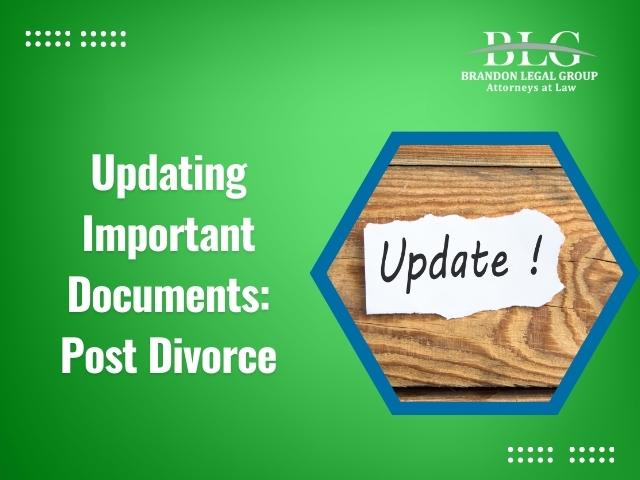A divorce is a significant life event that brings about numerous legal and financial changes. While navigating the emotional and practical aspects of this transition, it’s crucial to update important documents to reflect your new circumstances. Failing to do so can have severe consequences, including legal disputes, financial losses, and the potential invalidation of your wishes.
Why Updating Documents is Crucial After a Divorce
Updating your important documents after a divorce is essential for protecting your legal rights and financial interests. A divorce fundamentally alters the legal and financial relationships you previously had with your former spouse, and these changes must be accurately reflected in relevant documents.
By taking the necessary steps to update your documents, you can ensure that your affairs are in order, your wishes are respected, and your assets are safeguarded. This process is critical to maintaining control over your life and avoiding potential conflicts or legal complications down the line.
Key Documents to Update After a Divorce
Ensuring your affairs are in order and your wishes are respected requires updating several key documents after a divorce.
Estate Planning Documents (Will, Trust, Power of Attorney)
Estate planning documents, such as your will, trust, and power of attorney, should be reviewed and updated to remove your former spouse as a beneficiary, executor, or decision-maker. This step is crucial to ensure that your assets are distributed according to your current wishes and that the individuals you trust are empowered to act on your behalf.
Insurance Policies (Life, Health, Auto, Home)
Insurance policies often name spouses as beneficiaries or covered parties. After a divorce, it’s essential to update these policies by removing your former spouse and designating new beneficiaries or covered individuals.
The following is a DRAMATIZATION AND IS NOT AN ACTUAL EVENT: In one case, a divorced individual failed to update their life insurance policy, resulting in their former spouse receiving a substantial payout, contrary to their wishes.
Financial Accounts (Bank Accounts, Investments, Retirement Accounts)
Review and update the beneficiary designations on your bank accounts, investments, and retirement accounts to remove your former spouse’s access and ensure that these assets are inherited by your intended beneficiaries.
Property Titles and Deeds
If you and your former spouse owned property together, it’s essential to update the titles and deeds to reflect the ownership changes outlined in your divorce agreement. This step ensures clarity regarding property ownership and prevents potential disputes or conflicts in the future.
Additional Considerations and Updates
Beyond the key documents mentioned above, there are several additional considerations and updates that can help minimize potential conflicts and ensure a smooth transition after a divorce.
Name Change (Social Security, Driver’s License, Passport)
If you have chosen to change your legal name after the divorce, it’s important to update your name on essential documents such as your Social Security card, driver’s license, and passport. This step ensures consistency across all your legal documents and avoids potential issues or delays.
Employment and Benefits Updates
Notify your employer about your divorce and update any relevant employment and benefits documents, such as health insurance policies or retirement plan beneficiaries.
Digital Accounts and Subscriptions
Review and update your personal information and access credentials for digital accounts, subscriptions, and online services. This step ensures that your former spouse no longer has access to sensitive information or accounts tied to your identity.
Seeking Professional Guidance for Document Updates
Ensuring compliance with legal requirements and avoiding costly mistakes during the document update process is essential. Consulting with an experienced divorce attorney can provide invaluable guidance and ensure that no important details are overlooked.
A skilled divorce attorney can guide you through the intricate process of updating your documents, identifying all relevant documents that require attention and ensuring that the necessary changes are made accurately and in compliance with legal requirements. Their expertise in family law can help you navigate this complex process, minimizing the potential for errors or oversights that could lead to legal disputes or financial losses.
Don’t risk the consequences of failing to update your important documents after a divorce. Contact our law firm today to schedule a consultation with one of our experienced divorce attorneys. We will guide you through the process, ensuring that your legal rights and financial interests are protected as you embark on this new chapter of your life.
Conclusion
Updating important documents after a divorce is a crucial step in safeguarding your legal rights, financial interests, and personal wishes. By taking the time to review and update key documents, such as estate planning documents, insurance policies, financial accounts, and property titles, you can ensure that your affairs are in order and aligned with your current circumstances.
At Brandon Legal Group, we understand the complexities involved in navigating the post-divorce transition. Our team of experienced divorce attorneys is dedicated to providing comprehensive guidance and support, ensuring that no detail is overlooked in the process of updating your important documents.
Don’t leave your future to chance. Contact Brandon Legal Group at (813) 902-3576 to schedule a consultation and ensure that your legal and financial affairs are in order as you embark on this new chapter of your life.
FAQs
1. What are the potential consequences of not updating important documents after a divorce?
Failing to update important documents after a divorce can lead to legal disputes, financial losses, and the potential invalidation of your wishes. Your former spouse may inadvertently or intentionally gain access to assets, accounts, or decision-making powers that you no longer intend for them to have.
2. Why is it important to seek professional guidance from a divorce attorney?
An experienced divorce attorney can provide invaluable guidance and expertise in identifying all relevant documents that need to be updated and ensuring that the necessary changes are made accurately and in compliance with legal requirements. Their knowledge of family law can help you navigate this complex process and avoid costly mistakes.
3. What types of documents typically need to be updated after a divorce?
Some of the key documents that typically need to be updated after a divorce include estate planning documents (will, trust, power of attorney), insurance policies (life, health, auto, home), financial accounts (bank accounts, investments, retirement accounts), property titles and deeds, as well as employment and benefits documents.
